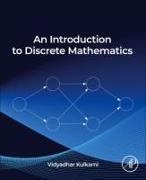Read more
An Introduction to Discrete Mathematics offers an engaging and accessible introduction to discrete mathematics for beginning undergraduate students across a wide range of application areas, from mathematics to statistics, operations research, business, engineering, and the sciences. It provides solid foundation in precise proof writing methods, with early chapters introducing set theory and logic that are followed by deductive and inductive proof techniques, number theory, counting principles, permutations and combinations, probability of events, random variables, graphs, and weighted graphs.
The book illustrates fundamental concepts in discrete mathematics with clear and precise definitions that are paired with examples and counter-examples as applied in combinatorics, discrete probability, and graph theory. Chapters include student exercises to enhance learning, and a solutions manual and example questions are available for instructors on a companion website.
List of contents
Part I - Foundations1. Number System
2. Logic and Deduction
3. Sets, Functions, Sequences, Sums
4. Induction, Recursion
5. Elementary Number Theory
Part II - Combinatorics6. Basic Principles of Counting
7. Permutations and Combinations
8. Further Topics in Counting
Part III - Discrete Probability9. Probability of Events
10. Random Variables
Part IV - Graphs and Networks11. Graphs
12. Weighted Graphs
About the author
Professor Kulkarni received his Bachelors in Mechanical Engineering in 1976 from the Indian Institute of Technology, Bombay, and his Doctorate in Operations Research from Cornell University, in 1980. He is currently a Professor in the Department of Statistics and Operations Research at the University of North Carolina at Chapel Hill. Dr. Kulkarni is an author of an undergraduate textbook titled Introduction to Modeling and Analysis of Stochastic Systems, and a graduate textbook titled Modeling and Analysis of Stochastic Systems.

